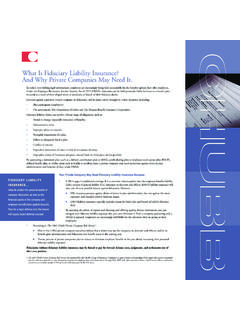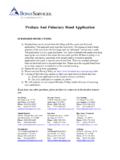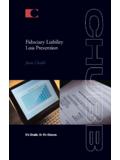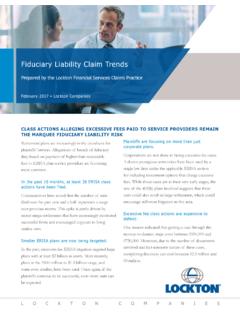Transcription of A Review of Fiduciary Duties in California and …
1 A Review of Fiduciary Duties in California and Delaware Corporations Edward Gartenberg1. Introduction T he legal community and the press have focused much attention on the responsibilities of corporate offi- cers and directors under the federal Sarbanes Oxley Act. In addition, the daily press has been replete with examples such as the Enron litigation demonstrating the federal criminalization of corporate law. The advantages and disadvantages of the increasing federalization of the Duties owed in the corporate context have been, and will Edward Gartenberg Mr. Gartenberg is a continue to be, a source of However, the business practitioner, and particularly, the business litigator in partner with Thelen Reid California , will most often look to the principles of state Fiduciary duty law to evaluate potential claims within the & Priest LLP in Los Angeles, California .
2 He serves corporate context. Given the historical predilection for incorporation in Delaware, the California lawyer practic- as Chair of the firm's Securities Litigation and ing in this area should have familiarity with both Delaware and California law. This article seeks to present a brief Enforcement Defense summary of Fiduciary Duties in the corporate context under the laws of both states. Group. He is Vice Chair of the Business Law Section The corporation presents potential Fiduciary duty issues for shareholders, directors, officers, employees, Partnerships and LLCs Committee. He specializes and promoters. It is often stated that shareholders do not owe a Fiduciary duty in their capacity solely as share- in corporate, partnership and securities litigation. holders to either the corporation or other shareholders. (See Jones v. Ahmanson & Co.)
3 (1969) 1 93.). The Jones case did identify certain circumstances in which a Fiduciary duty may be imposed under California law: when a majority shareholder usurps a corporate opportunity from, or otherwise harms, the minority shareholder. (Id. at p. 108.;. Miles, Inc. v. Scripps Clinic and Research Foundation ( Cal. 1993) 810 1091, 1099 (applying California law, The general rule of limited liability of corporations is that shareholders do not owe each other a Fiduciary duty.); Ivanhoe Partners v. Newmont Min. Corp. (Del. 1987) 535 1334, 1344 (Under Delaware law a shareholder owes a Fiduciary duty only if it owns a majority interest in or exercises control over the business affairs of the corporation.). A careful analysis suggests that one must consider whether the corporation is closely held and whether the shareholder is a con- trolling shareholder.
4 In both California and Delaware, as in other jurisdictions, it has been held that the controlling shareholder owes a Fiduciary duty to both the corporation and the minority shareholders. In closely held corporations, there are two principal views of the Fiduciary duty of shareholders. Massachusetts and a number of other jurisdictions have adopted what has been characterized, probably improperly, as the majority view. This view holds that, at least in a closely held corporation, all officers, directors, and shareholders are fiduciaries of each other and, in that capacity, owe each other a heightened Fiduciary duty, similar to that which partners owe each other in a partnership. Delaware follows what has been characterized as the minority view that controlling shareholders, at least in closely held corpora- tions, like officers and directors, owe Fiduciary Duties to the corporation.
5 (See, , Hollinger International, Inc. v. Black (Del. 2004) 844. A. 2d 1022, 1061, fn. 83; In re Summit Metal, Inc. ( 2004) Westlaw 1812700, *12.) A shareholder need not own a majority of the corporation's share to be a controlling shareholder. Thus, even if a shareholder owns less than 50% of the outstanding shares, if that shareholder exercises domination through actual control of corporate conduct, the shareholder can be deemed a controlling shareholder. (See Citron v. Fairchild Camera & Instrument Corp. (Del. 1989) 569 53, 70; Ivanhoe Partners v. Newmont Mining Corp. (Del. 1987). 535 1334, 1344.) The Duties for controlling shareholders as expressed in at least some Delaware cases appear to be owed to the corpo- ration only; California cases hold that the Duties are owed to both the corporation and other shareholders. The controlling shareholder in a Delaware corporation, unlike a partner in a general partnership who owes a Fiduciary duty to all other partners, does not owe a Fiduciary to the other shareholders.
6 Under Delaware law, however, a controlling shareholder may vote his shares in his own self-interest even if that interest is contrary to the corporation's best interest. (Thorpe, et al. v. CERBCO, etc. (Del. 1996) 676 436 (controlling shareholders have a right to vote as shareholders in their own self-interest).). In both Delaware and California , the Fiduciary Duties owed by a controlling shareholder include the Duties of loyalty and care. The application of those Duties in Delaware are often presented in the context of alleged self-dealing transactions ( where the controlling shareholder is effectively on both sides of the transaction). Self-dealing is not per se invalid under Delaware law, but rather is subject to the entire fairness test. By being on both sides of the transaction, the controlling shareholder bears the burden of proving the entire The State Bar of California Business Law News 7.
7 Fiduciary Duties fairness of the transaction. (Kahn v. Tremont, Corp. ( 1997) Ahmanson & Co. (1969) 1 93, 108] adopted the 694 422, 428; Lynch Communication Sys. Inc. ( 1994) comprehensive rule of good faith and inherent fairness 638 110, 1115.) Delaware courts also apply the entire fairness to the minority in any transaction where control of the test wherever the Fiduciary will receive a financial benefit from the corporation is material (id. at p. 112), and declared transaction at issue that is not equally shared by all the stockhold- broadly that [t]he rule applies alike to officers, direc- ers. (In re LNR Property (Del. Ch. 2005) 896 169, 175.) It tors, and controlling shareholders in the exercise of has been held that the disparity must be more than a de minimus powers that are theirs by virtue of their position and to departure from equal treatment.
8 (McGowan v. Ferro ( 2004) transactions wherein controlling shareholders seek to 859 1012, 1029.) gain an advantage in the sale or transfer or use of their Entire fairness has two components: fair dealing and fair controlling block of shares. (Id. at p. 110.). price. Fair dealing includes such factors as when the transaction Stephenson v. Dreyer (1997) 14 Cal. 4th at 1178. was timed, how it was initiated, structured, negotiated, disclosed The Stephenson court quoted Jones v. Ahmanson & Co., to the directors, and how approvals were obtained. Fair price supra, 460 464 at p. 110, holding that majority shareholders relates to the economic and financial consideration for the deals. may not use their power to control corporate activities to benefit (See Weinberger v. UOP, Inc. ( 1983) 457 701703.) themselves alone or to the detriment of the minority and that any California case law provides authority indicating that a use of the power to control the corporation must benefit the share- controlling shareholder owes Fiduciary Duties to both the cor- holders, proportionately and must not conflict with the proper poration and the minority shareholders.
9 (See, , Stephenson v. conduct of the corporation's business. (Jones. v. Ahmanson & Co., Dreyer, (Cal. 1997) 16 1167, 1178 (stating that control- supra, 1 at p. 108.). ling shareholder's Fiduciary Duties include good faith, inherent In Jones v. Ahmanson, a minority stockholder in a savings fairness and equal opportunity for minority shareholders); Jones and loan association brought a derivative action against a holding v. Ahmanson & Co. (Cal. 1969) 460 464, 471 (holding that company formed by defendant majority stockholders and officers any use of the corporation or controlling power must benefit all of the association. Essentially, the plaintiff contended that to take shareholders equally).) In Stephenson, a minority shareholder and advantage of a bull market in savings and loan stock, the major- former employee brought an action against the majority stock- ity stockholders formed a holding company, transferring to it the holder of a closely held corporation and two of its officers and control block of association stock in exchange for a considerably directors for breach of Fiduciary duty and misuse of corporate greater number of holding company shares, excluding the minority assets.
10 The plaintiff was a party to a buy-sell agreement giving the stockholders from participating therein, pledging the association's corporation the right (and obligation) to repurchase the shares of assets and earnings to secure the holding company's debt that had the minority shareholder on the termination of his employment. been incurred for their own benefit, and finally, having thus left the The precise issue presented was whether the agreement, on its face, minority with stock whose potential market had been destroyed, implied an intention to deny the minority shareholder his rights using that very fact as a basis for offering to buy stock at an exchange post-employment but before the shares were transferred. The Cal- rate less favorable than they themselves had enjoyed. In addition, the ifornia Supreme Court held it did not. The court explained that majority through the newly formed holding company caused the corporate shareholders have valuable property rights including the savings and loan association to cease paying dividends, other than right to dividends voted by the boards.





